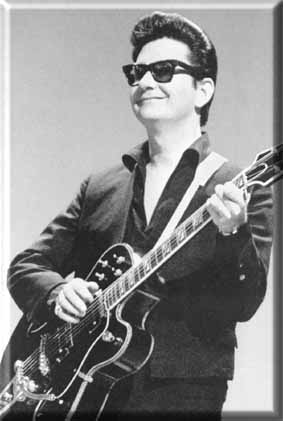
Roy Orbison

Roy Orbison was born on April, 23, 1936, in Vernon, Texas. Critical
acclaim came too late for one of the leading singers of the 60s. He became the master of
the epic ballad of doom-laden despair, possessing a voice of remarkable range and power,
and often finding it more comfortable to stay in the high register.
The former reluctant rockabilly singer, who worked with Norman Petty and Sam Phillips in
the 50s, moved to Nashville and became a staff writer for Acuff-Rose Music. He used his
royalties from the success of 'Claudette', recorded by the Everly Brothers, and written
for his first wife, to buy himself out of his contract with Sun Records, and signed with
the small Monument label. Although his main intention was to be a songwriter, Orbison
found himself glancing the US chart with 'Up Town' in 1960. A few months later, his song
'Only The Lonely' was rejected by Elvis Presley and the Everly Brothers, and Orbison
decided to record it himself. The result was a sensation: the song topped the UK charts
and narrowly missed the top spot in the USA. The trite opening of 'dum dum dum dummy doo
wah, yea yea yea yea yeah', leads into one of the most distinctive pop songs ever
recorded. It climaxes with a glass-shattering falsetto, and is destined to remain a modern
classic.
The shy and quiet-spoken Orbison donned a pair of dark-tinted glasses to cover up his
chronic astigmatism, although early publicity photos had already sneaked out. Over the
next five years he enjoyed unprecedented success in Britain and America, repeating his
formula with further stylish but melancholy ballads, including 'Blue Angel', 'Running
Scared', 'Crying', 'Dream Baby', 'Blue Bayou' and 'In Dreams'. Even during the takeover of
America by the Beatles (of whom he became a good friend), Orbison was one of the few
American artists to retain his ground commercially. During the Beatles' peak chart year he
had two UK number 1 singles, the powerful 'It's Over' and the hypnotic 'Oh Pretty Woman'.
The latter has an incredibly simple instrumental introduction with acoustic guitar and
snare drum, and it is recognized today by millions, particularly following its use in the
blockbuster film Pretty Woman.
Orbison had the advantage of crafting his own songs to suit his voice and temperament, yet
although he continued to have hits throughout the 60s, none except 'It's Too Soon To Know'
equaled his former heights; he regularly toured Britain, which he regarded as his second
home. He experienced appalling tragedy when, in 1966, his wife Claudette was killed as she
fell from the back of his motorcycle, and in 1968, a fire destroyed his home, also taking
the lives of his two sons. In 1967 he starred as a singing cowboy in The Fastest Guitar
Alive, but demonstrated that he was no actor.
By the end of the decade Orbison's musical direction had faltered and he resorted to
writing average MOR songs such as the unremarkable 'Penny Arcade'. The 70s were barren
times for his career, although a 1976 compilation topped the UK charts. By the end of the
decade he underwent open-heart surgery. He bounced back in 1980, winning a Grammy for his
duet with Emmylou Harris on 'That Lovin' You Feelin' Again' from the film Roadie, and
David Lynch used 'In Dreams' to haunting effect in his chilling film Blue Velvet in 1986.
The following year Orbison was inducted into the Rock And Roll Hall of Fame ; at the
ceremony he sang 'Oh Pretty Woman' with Bruce Springsteen.
With Orbison once again in favor, Virgin Records signed him, and he recorded an album of
his old songs using today's hi-tech production techniques. The result was predictably
disappointing; it was the sound and production of the classics that had made them great.
The video A Black And White Night showed Orbison being courted by numerous stars,
including Springsteen, Tom Waits and Elvis Costello. This high profile led him to join
George Harrison, Bob Dylan, Tom Petty and Jeff Lynne as the Traveling Wilburys. Their
splendid debut album owed much to Orbison's major input. Less than a month after its
critically acclaimed release, Orbison suffered a fatal heart attack in Nashville. The
posthumously released Mystery Girl in 1989 was the most successful album of his entire
career, and not merely as a result of morbid sympathy. The record contained a collection
of songs that indicated a man feeling happy and relaxed; his voice had never sounded
better. The uplifting 'You Got It' and the mellow 'She's A Mystery To Me' were impressive
epitaphs to the legendary Big 'O'.
Images Copyrighted of their respective
owners.(c)2002